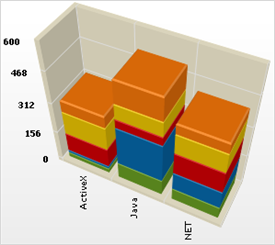
This topic discusses useful information that will help you to ensure that your data is rendered properly in the 3D stacked column chart.
While the Chart control allows you to easily point the chart to your own custom data, it is important that you are supplying the appropriate amount and type of data that the chart requires. If the data does not meet the minimum requirements based on the type of chart that you are using, an error will be generated.
The following is a list of data requirements for 3D stacked column charts:
The data set contains one or more numeric columns.
The columns must contain values that are either all positive, or all negative. All columns of the same row are stacked into a vertical column.
If you are binding the 3D stacked column chart to a series object, see Requirements for Series Binding for information on the series binding requirements.
The chart data is rendered using the following rules:
Each row represents a single column or "stack", which is divided into sections.
If there are multiple rows, each row constitutes a different stacked column.
Each column value in each row represents a section of a stacked column.
See below for an example data set, along with the rendered 3D stacked column chart.
